#of course when I mention those periods I'm mostly talking about France because that's where I'm from
Explore tagged Tumblr posts
Note
hi!! i first wanted to say that your art has been really inspirational for me getting back into digital art and i’m incredibly grateful for that!!❤️ also wanted to ask what era of fashion do you tend to enjoy drawing and if there are any places for clothing references you use in particular? thanks!!
Hello, thanks a lot !! There are a lot of historical periods that inspire me clothing-wise and it really depends on what my current hyperfixation is. Obviously, I'm really into musketeer stuff these days so I'm deep into 17th century fashion.
When it comes to middle ages, I'm not super knowledgable about most of it but I love early medieval craftswork and jewelry and I use it as an inspiration a lot like in this. I also love late medieval/early renaissance clothing, so mostly 15th century stuff.
There's also a big chunk of time from the 1790s to the 1830s more or less with a huge variety of styles that I really like, it's kind of vague but what can I say !! They kept on serving ! I also love the 70s lol
As for references, I use online museum collections a lot. These days I often hang out on the Victoria & Albert Museum website for example, they have a good chunk of the collections digitized and tagged by era/type of garment, etc. I have a few exhibitions catalogues in my library that I use sometimes, as well as Racinet's Costume History, which isn't perfect but can help with grasping changes in silhouettes and so on.
And of course, portraiture is always a really good base so I compile a lot into pinterest boards, like you do.
#replies#wobots#of course when I mention those periods I'm mostly talking about France because that's where I'm from#there are a lot of fashion styles I love from other countries at various times but I'm not super knowledgable#and I wouldn't want to make this reply endless#period costuming#historical fashion
113 notes
·
View notes
Text
Quick Thoughts on DD Book 1 Chapter 4
• Jesus, this book is expensive.
• Like I assumed Chapter 3's one accomplishment-one-or-two-LIs-or-a-family-member thing would be a one-off, just to introduce us into the system/ease us into the story, but no...they've (sort of) repeated it this chapter. I was hoping they would spread out the accomplishments at least, but perhaps they want us to have at least most of the accomplishments worked out before we leave for London.
• I really hope this doesn't become a regular thing because it will only cause players to lose interest in the books for lack of affordability, in the long run. As it is the book largely caters to a niche audience...alienating that audience by having them lose of on half the story won't bode well for the book.
• Title: Best Foot Forward. Man, this one is easy. Of course it refers to dancing. And quite a lot of dancing is done this chapter, that's for sure!
• Sooo...the Earl has decided to introduce us into society in Edgewater with a garden party. Lots of hobnobbing, some dancing, a few games and you meet at least one 'suitor'.
• Did You Know: According to writer and garderner Kim Wilson, who wrote a book titled In the Garden with Jane Austen, gardens were viewed as markers of social status. In an interview with The Scotsman, she says, "each family's garden reflected not only their needs but, if they had enough money, their social aspirations". The poor cottagers of the time were mostly concerned with growing food and having a place to keep their chickens whereas wealthier families would have had kitchen gardens, but also often extensive pleasure grounds, which were places to display their wealth and taste. (from an article about Jane Austen's love for gardens in The Scotsman).
• Last chapter had us learning (optionally) the art of the fan from our Lady Grandmother, so it makes sense that what happens in this chapter is this:

Lololol just kidding.
• So the chapter begins with the MC and Briar talking. Briar is excited about the fact that a Duke (who, she reminds us, is "one step below a Prince Regent"), and the MC can either choose to be excited or very confident. Interestingly, if you're excited, she reminds you to "not forget your roots", which I think is a recurring theme in this book. After all, that was the last thing the MC's mother told her on her deathbed.
• Dominique enters the room and both she and Briar present us with a pretty pink lace dress that is sure to improve both our social standing and catch everyone's eye at this introductory garden party.
• It looks quite pretty, actually. But that's because I love lace.
• We head downwards, finding Annabelle performing for herself in the foyer and having a thoroughly good time.
• I'm wondering if I should have a tally for the number of times she says "a thousand pardons" (and for the record, I think her way of saying "fiddlesticks" is adorable xD).
• Our third "accomplishment" (and our second paid one) is presented to us here: dancing. It's not like the MC doesn't know dancing - she does - it's that the country dances (this might be a reference to the English Country Dances that were popular among all classes) are different from the ones Annabelle has learned, and indeed the popular ones for the aristocracy that are coming in from other places, like France.
• Annabelle mentions a couple of dances that were popular for its time: the cotillion (originated from France), the Quadrille (also from France), and La Boulanger (also French). If we choose the shoes the Lady Grandmother got made for us, Annabelle wastes no time in teaching us the last one.
• Annabelle speaks to us about the Quadrille being new. She isn't lying. The Quadrille became fashionable in England around 1815.
• Again, the good thing about the accomplishment scenes is that they're meant only for learning the skill, and Annabelle can develop in her individual scenes independent of this. Though I'm not sure if cramming both her individual scenes and her accomplishment scenes in the same chapter, two chapters in a row is a very good idea.
• Another marker of how new the MC is, lies in her interaction with Mr Woods (who is perhaps the only member of the housing staff we see at the party. Briar disappears completely after she's done her work of getting the MC ready, and Luke doesn't appear either). Mr Woods is surprised the MC deigns to speak to him in public, and Henrietta uses her interaction with him to point out how little she fits in, what with talk of the MC's "roots".
• Lol the exchange with the Earl if you bought the scene with the Lady Grandmother is quite funny haha. He speaks about Dominique drilling him into learning the names of all the families and the MC - saucy little shit that she is 😄 - looks at her fan and says "oddly enough, I know exactly what you mean".
• Ernest Sincliare makes his appearance after two chapters, and there's some banter about compliments if you're wearing the pretty lace dress I think. She teases him about it and he retorts that since he passes compliments so rarely, you can be sure that when he does he means every word. I can see that logic in that, Sinclair, but must you look like a child who has accidentally sucked on a particularly sour lemon when you do? 😂
• Throughout the chapter, you get references to the Season in London, and each time the MC by default takes it for granted that she will not be going there. Sinclaire hosts parties in London, Annabelle Parsons will be going there for the Season. Up until the end of the chapter, the vibe given overall is that she won't be seeing the two for a while now that they will be leaving Edgewater, and she won't.
• Did You Know: The London Season was developed to coincide with the sitting of parliament. During the months when parliament was in session, members of both Houses needed to be in attendance in London and came to the capital bringing their families with them. The London season grew up in response to this influx of upper class people who needed to be entertained.
Amanda Foreman, in her biography on Georgiana, Duchess of Devonshire, stated: "the aristocratic "season" came into existence not only to further the marriage market but to entertain the upper classes while they carried out their political duties. The season followed the rhythm of Parliament: it began in late October with the opening of the new session, and ended in June with the summer recess.” of course, later on this period of time gradually began to shift.
There also seems to be something called the "little season", but that seems more a fixture of the Victorian age than the Regency one (as mentioned in the article on the London Season from the Regency History website).
• The Earl and Mr Sinclaire share a more than cordial relationship: the Earl treats him with considerable warmth and Sinclaire shows a genuine respect and regard for him. You have a choice of asking him whether it is the Earl - or you - he has respect for (and the second option leads to a romantic moment), but it is what he says about the Earl, and his later interaction with Duke Richards that intrigues me:

What happened to Ledford Park that the Sinclaires almost lost it? Why does his statement towards the Duke about Ledford sound so accusatory? Why is there such a strong undercurrent within the latter interaction? I want to know what the story behind Ledford Park is, and how the Earl helped save it.
• One of my favourite Sinclaire-related sequences is an additional scene featuring the fan, as taught to us by the Dowager Countess the previous chapter. I tried the last two with Florence, the MC who has no interest in Sinclaire:
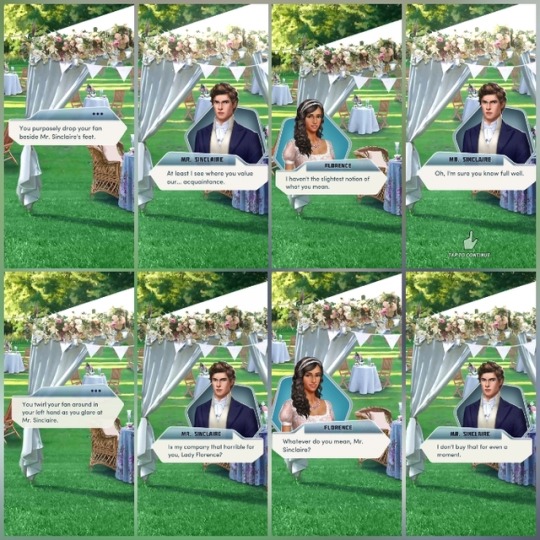
(the first four screenshots are from the "friends" option, and the next four from the "go away u suck" option)
Meanwhile, Marianne just goes in for the kill, fam. Homegirl didn't learn all those thot moves from Grandma for nothing 😄

I do like that extra bit of sexual tension in this scene. I'm not very into Sinclaire yet, but I can see the appeal he'd have for someone who would want the Mr Darcy type of Regency male LI character. You also see a fair bit of it in the scene where the MC asks him if it is her he respects:
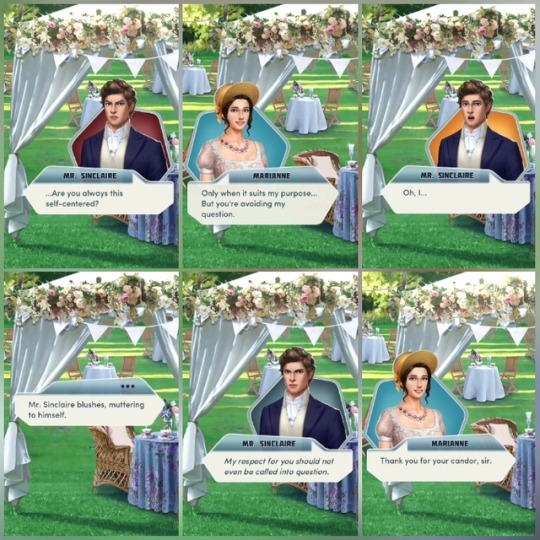
• Sinclaire, dude, what is it with you and Italics??
• We now interrupt our regular programme with a game of Skittles. I'm not sure how many of you assumed Regency-era aristocrats were going to start passing around fruit-flavoured candy but I sure did 😂
• So this is skittles, played with nine pins. Very much one of the precursors to present day bowling from what I've read. Playing this game, and beating a champion like Mr Sinclaire at it will not only allow you to spend time alone with him, but also increase your social standing.
• It's simple enough: hit the red pin in the centre, and if you want you can distract the hell out of Sinclaire after he's fired his first shot.
• Twice this chapter, you see our resident comic relief for the day: Miss Theresa Oh-My-Smelling-Salts Sutton, and Mr Edmund Do-I-Look-Like-I-Care Malcaster, and I've decided I like them both (I wanted to add screenshots, but tumblr mobile sucks and won't let me put up more than ten images 😒)
• So we meet the "handsome", "titled" eligible bachelor our Lady Grandmother wanted us so badly to marry and...
...um. lol. ok.
Handsome? Charming? When was the last time you looked in the mirror dude, 20 years ago?
• You have a choice of how to respond after Duke Richards insults Mr. Sinclaire. You can either choose the Manners option, or you can choose to outright sass the man. If you don't sass him? The Lady Grandmother will do it for you.

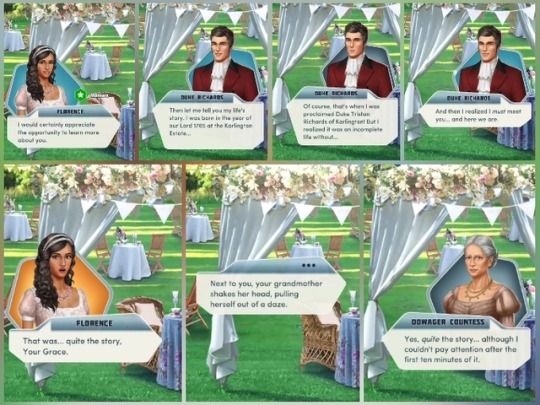
• With the Manners option we find out that the Duke is 51 years old.
• With the non-manners option we find out that the dude likes saucy little minxes.
• @ the last panel in Florence's playthrough, Grandma even you can't deal with this dude for two minutes without nodding off. Why are you dumping him on my head then? (don't tell me. I know the answer 😐). See, this is why Florence will eventually kiss her inheritance goodbye lol.
• Jesus can this man just...speak two words without touching me??
• FINALLY. Miss Parsons. We choose a hiding place to get away from the Duke and then she offers to show us a new part of the estate: the lakefront. The great thing about gardens, esp in the writing of the time, was that it provided privacy for people at the time and allowed them to interact in ways they couldn't in public.
• Did you know: Austen herself used gardens pretty extensively in her writing. Mr Knightley confesses his love to Emma close to a shrubbery. Elizabeth jokes to her aunt about deciding to marry Mr Darcy after seeing the grounds in Pemberley. Fanny Price of Mansfield Park remarks, “To sit in the shade on a fine day, and look upon verdure, is the most perfect refreshment.” Catherine Morland of Northanger Abbey falls in love with hyacinths, Marianne Dashwood of Sense and Sensibility has a passion for fallen leaves in an autumnal garden, while Anne Elliot of Persuasion is always inspired to think of poetry when enjoying the beauties of nature.
Susannah Fullerton in her essay "Jane Austen and her gardens" (for the website Garden Drum) says: "Many proposals [in Austen's novels] take place out of doors where lovers can find some privacy amongst the gravel walks and flower beds; garden improvements are planned by some of the characters; and her heroines all enjoy going into a garden to think".
• Makes sense then that one of the special scenes of this largely "forbidden" relationship (if you choose for that to happen) would take place in greenery, close to a lake. If you notice, it's quite in keeping with the times that most of the romantic moments this chapter happen either in an isolated section of the gardens or while dancing, both of which allow for some measure of interaction between people interested in each other.
• Miss Parsons, the legendary hero of a Duck Prophecy xD
• I love her in this scene. Sure she gets shy when she receives attention she's not used to from us, and she's kind and educative and sweet, but she's also boisterous and passionate and not afraid to pull punches when she needs to (case in point: the shade she immediately throws Henrietta's way regarding her "tutelage"). This scene has her stealing cake from the party to feed the ducks, getting exhilarated from the race and her new friendship with the MC, and feeling extremely confused by her feelings if you speak to her romantically.
• The first half of this scene is pure fun, but the second inevitably shows the two women experiencing a sense of loss that their connection will be cut short - whether they are friends or whether this is a budding romance.
• What I do love about both the romance scenes are the extra touches added to both in the coding. In the skittles scene with Ernest, Marianne is spoken of by default as brushing her hand against his before giving him the ball, whereas Florence simply passes it to him.
• Even with Annabelle, if you acquire romance points with her, the ending of that scene is written quite differently:

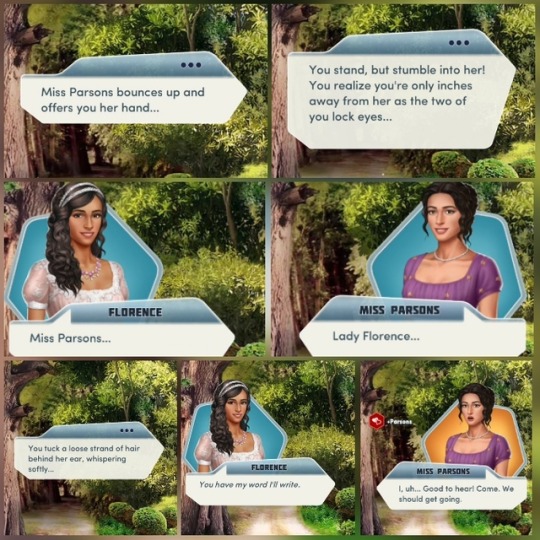
I absolutely love this part of the scene. And given that very often the female LI is treated like just the default best friend with some stray romance options attached, it really does feel good to have that sexual tension acknowledged.
• Florence, babe, what is it with you and Italics??
• TIME TO PUT ON OUR DANCING SHOES GUYS (if we bought them).
• So we're doing a dance called La Boulanger...which kinda looks like this:
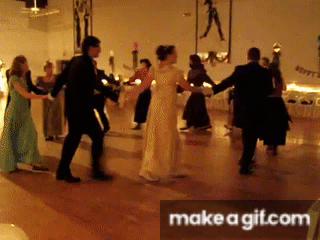
You dance in a circle, then keep switching partners.
• Did You Know: that the Boulanger was one of the very few dances mentioned by name in Jane Austen's novels? (Pride and Prejudice Chapter 3. I think the reel is mentioned in another).
• I have two left feet unless someone is heavily choreographing a flash mob and spends ages teaching me the steps lol so this looks pretty complicated to me 😂
• You have an option of choosing between Mr Sinclaire, Miss Parsons and Duke Richards. The first two are the usual you'd expect from romantic dance scenes if you choose either of the first two, impressing them with your dance moves and then catching their eye when you're dancing with Edmund, your stepbrother. With Miss Parsons there is an additional show of boldness in that there is a danger of making their affections public.
• The Duke Richards option, which I managed to see thanks to @i-dream-so-i-write ...seems pretty okay actually. He doesn't seem as handsy and creepy as he does in our first meeting (there is a moment where his "hands skim your waist" though, and he tells us we've been apart too long [a couple seconds, tops]), but he's also still talking our ears off. If anyone is interested in seeing it, I can attach the screenshots!
• This man is so freaking extra I can't even.
• The chapter ends with the Earl announcing that he is changing his will, and that the MC is heiress to Edgewater Estate now, which makes it essential for her, then, to make her debut at the London Season, and begin searching for prospective bridegrooms.
• There is a catch though. You get the inheritance if you marry someone of suitable rank. In short...at this point in the story, Marianne is doing alright, but Florence is well and truly screwed until there is a twist somewhere (and surely there will be at some point). Sorry Florence.
• Henrietta has something up her sleeve, and Edmund, who was expecting to inherit, is sad and tells the MC so. You get a relationship point with him if you tell him you understand how it must feel, but he reiterates that you probably won't. We have time, we can still get this dude (and his palpitating fiancée) on our side. Maybe.
• Looks like we'll be starting our journey to London straightaway, and making our debut in London at Mr Sinclaire's party by Chapter 6. Alsooo from the spoilery chapter descriptions it looks like Mr. Marlcaster will try tripping us up at least once, or more than once. Also looks like we have two more skills on our accomplishment board to learn. So far we've gotten needlework, music and dancing - we now need to see what the other two are. I THINK one of them is painting.
General Thoughts:
• Good chapter. It's a little slow which is fine, because I think all the action will actually happen during the London Season instead. We meet only two suitors, one of whom we have already met in the first chapter.
• I feel like the extra scenes that we'll get with the unlocked accomplishments will include other styles of the same art. We initially learn the piano, but I feel like unlocking it will lead to extra scenes with other instruments, and unlocking the dancing shoes will show us extra scenes of Annabelle teaching us other dances (the waltzes, the reel, etc). I'm not entirely sure about this, it's just a theory I have. I mean, once we're in London we'll need to learn waltzes and the minuet and stuff.
• Luke doesn't make an appearance this chapter, but then again nor does Briar as soon as the MC gets ready. I think we'll see more of him now that we will be traveling to London.
• Donna Hatch's (who writes a ton of historical romances, esp Regency) essay on the London Season lists the months active in each year for it, and in 1816 it was from February to July. In the story it's now the beginning of April. Usually it's best to go at the very start if you're looking for marriage prospects, but given the MC's particular circumstances this time of the season isn't too bad either I'd reckon.
• Remember how I told you guys last chapter about the inclusion of Mary Brunton's Self Control? And how she criticizes the popular "rake" figure in Regency fiction? I'm not sure Duke Richards adheres completely to how rakes were depicted at the time, but he definitely does seem to be channeling Colonel Hargrave a little here.
• I wonder what the Duke seems to be hiding. Besides of course the truth of his equation with Sinclaire. Why is he so focused on this new woman? I think there might be more to this. I also can't wait to see the other suitors, like the viscount and Mr Chambers.
• I do like how we learn more about Sinclaire and Annabelle here. Annabelle largely has the role that Hana had in TRR, and there are some similarities - but she also has a lot more wiggle-room and seems to be bolder and a little more outgoing. She has grown up with the limitations placed on women at the time, but unlike Hana, hasn't faced as many restrictions in her upbringing.
• As I've mentioned before, I love Annabelle and I love that they're trying to do a better job of her. But I'm not entirely sure if cramming two separate scenes of hers in single chapters of an already expensive book is a wise choice, or if it will harm her development in the long run because people find it too expensive to spend on her. IMO the accomplishment scenes should be a little further spread out in the books.
• Now that the MC is going to be a future Countess, what is in store for her? In her rightful home Edgewater, she has a limited audience and not as much expectation to live up to...what will become of her now that she will be participating in the Season in London? Guess we'll find out today, or in the coming weeks xD
• Tagging: @boneandfur @liamraines @thespiritpanda @alanakusumastan @ernestsinclairs @mrsthomashunt @private-investigator-nazario @bcdollplace @queenodysseia @mcbangle
If you'd like to be tagged in one of the QTs, please let me know!
#desire and decorum#long post#ernest sinclaire#annabelle parsons#ernest x mc#annabelle x mc#dnd quick thoughts#quick thoughts#edgewater estate
37 notes
·
View notes